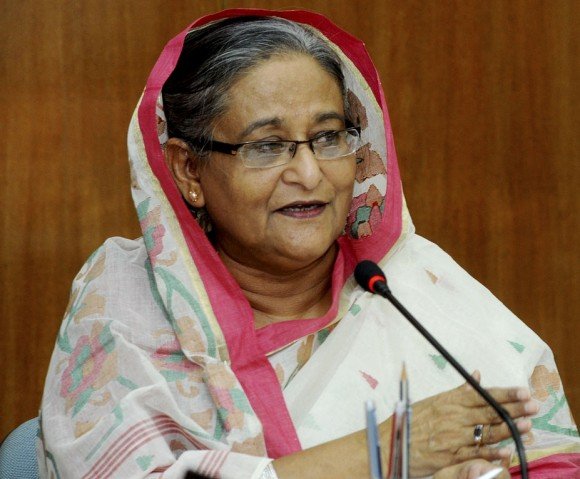Literature
Can Hasina act against Bangladeshi fundamentalists?

Conflicting signals, with
security connotations for India, are emerging from Bangladesh. The
Supreme Court has confirmed the death sentence of Ali Ahsan Mujahid, the
secretary general of the Jamaat-e-Islami (JeI), providing a further
feather to Prime Minister Sheikh Hasina's cap in her fight against
liberation-era war criminals. But successive assassination of bloggers
has not only brought to fore the Awami League's identity crisis but
exposed the Hasina-led administration's soft underbelly.
Let us
keep in mind one very important thing: The brouhaha generated in the
Indian media before and after Prime Minister Narendra Modi's Bangladesh
visit was entirely misplaced as the Land Boundary Agreement constitutes
the fringe area of bilateral relations. The core areas are
security-related issues, growth of fundamentalist terrorist outfits in
Bangladesh and export of their activities to India and, of course, the
sharing of river waters. Whether the Indian prime minister took up these
issues with his Bangladeshi counterpart is not known.
The
situation in Bangladesh has ominous portents - so much so that even the
prime minister chose not to send any public condolence to the wife of
slain Bangladeshi-American blogger Avijit Roy. Hasina might have done it
privately but her son Sajeev Wazed Joy had shocked the nation by
admitting that it was not possible for his party or its government to
stand for reason as the Awami League does not want to be characterized
as an atheist organization.
So one can conclude fairly safely
that Hasina's control over her country is shaky. This gives rise to
another very important question - to what extent would the judgments of
the war crimes tribunals be useful in rooting out religious
fundamentalism?
It is true that Abdul Quader Mollah and Mohammed
Qamaruzzaman, two top level functionaries of the JeI, have been executed
and similar orders have been passed against other party bigwigs. But
this has hardly affected the fundamentalist outfit which has nearly five
million members.
But the worrisome aspect for India, as well as
for Bangladesh, is that religious fundamentalism has been slowly
penetrating the Awami League also. Last April, the Awami Olama League,
the Awami League-backed mullah organization, demanded the death penalty
for secular and liberal bloggers, scrapping of the National Education
Policy as "it diminishes the role of Islam" and doing away with the
anti-child marriage law because "it goes against the Sunna.
Since
then, Awami League leaders have been trying hard to deny any connection
with this organization but this has not worked as two factions of the
Olama League have long been using the address of the Awami League
headquarters and participating in the latter's programmes. During the
last Ramadan, the Olama League had given its Iftar party at the
Ganabhavan, the official residence of the Bangladeshi prime minister.
One more bit of information will be interesting. The Olama League was
founded in 1996 with direct backing from Amir Hossain Amu, a bigwig of
the Awami League and an important minister in the Hasina government.
Sajeev
Wazed Joy's statement clearly indicates that his party will make a
difference between liberation-time war criminals and other
fundamentalist organizations, going hammer and tongs against the former
but possibly adopting a hesitant attitude towards the latter.
Not
only has the Bangladesh government failed to protect the young
bloggers; it has unleashed several repressive measures to gag their
voices. Some time back, a young lad named Asif Mohiuddin was jailed for
airing his views through blogs. Moreover, the government pressurized
blogging platforms to block the views of those it did not approve.
Perhaps
Hasina herself has realized that it is now difficult for anybody to
deny the space which fundamentalist politics has created for itself in
Bangladesh. According to Abul Barkat, a professor of economics at Dhaka
University, the Jamaat-e-Islami has created a "state within state" and
an "economy within economy'. It earns an annual profit of $278 million
from the different business ventures it runs. Ten percent of this goes
to sustain the JeI and fund other militant religious outfits.
According
to Barkat, while the mainstream national economy grows by six percent,
the growth rate of the Jamaat-controlled economy is nine percent.
Another startling figure is that the JeI-run economy amounts to 8.62
percent of the nation's developmental budget.
In 2005, Shayakh
Abdur Rahaman, the deceased leader of the Jamaat-ul-Mujahideen
Bangladesh, had boasted that he had helped 40 candidates win the
elections to the Bangladesh parliament. In spite of its social base
Jamaat had only a few MPs. So who were the other candidates winning on
JMB support?
Hasina certainly has her work cut out.
(Amitava
Mukherjee is a senior journalist and commentator. The views expressed
are personal. He can be contacted at amukherjee57@yahoo.com)



































